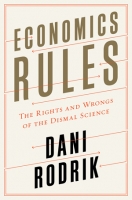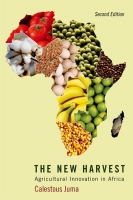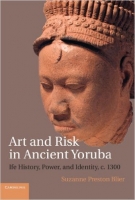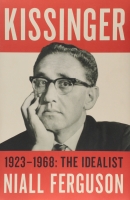Economics Rules
by Dani Rodrik
 In the wake of the financial crisis and the Great Recession, economics seems anything but a science. In this sharp, masterfully argued book, Dani Rodrik, a leading critic from within, takes a close look at economics to examine when it falls short and when it works, to give a surprisingly upbeat account of the discipline.
In the wake of the financial crisis and the Great Recession, economics seems anything but a science. In this sharp, masterfully argued book, Dani Rodrik, a leading critic from within, takes a close look at economics to examine when it falls short and when it works, to give a surprisingly upbeat account of the discipline.
Drawing on the history of the field and his deep experience as a practitioner, Rodrik argues that economics can be a powerful tool that improves the world—but only when economists abandon universal theories and focus on getting the context right. Economics Rules argues that the discipline's much-derided mathematical models are its true strength. Models are the tools that make economics a science.
Too often, however, economists mistake a model for the model that applies everywhere and at all times. In six chapters that trace his discipline from Adam Smith to present-day work on globalization, Rodrik shows how diverse situations call for different models. Each model tells a partial story about how the world works. These stories offer wide-ranging, and sometimes contradictory, lessons—just as children’s fables offer diverse morals.
Whether the question concerns the rise of global inequality, the consequences of free trade, or the value of deficit spending, Rodrik explains how using the right models can deliver valuable new insights about social reality and public policy. Beyond the science, economics requires the craft to apply suitable models to the context.
At once a forceful critique and defense of the discipline, Economics Rules charts a path toward a more humble but more effective science. (W.W. Norton & Company, Inc., 2015)
Weatherhead Center Faculty Associate Dani Rodrik is the Ford Foundation Professor of International Political Economy, Harvard Kennedy School.
The New Harvest: Agricultural Innovation in Africa,
2nd ed.
by Calestous Juma
 African agriculture is currently at a crossroads, at which persistent food shortages are compounded by threats from climate change. But, as this book argues, Africa faces three major opportunities that can transform its agriculture into a force for economic growth: advances in science and technology; the creation of regional markets; and the emergence of a new crop of entrepreneurial leaders dedicated to the continent's economic improvement. Filled with case studies from within Africa and success stories from developing nations around the world, The New Harvest outlines the policies and institutional changes necessary to promote agricultural innovation across the African continent. Incorporating research from academia, government, civil society, and private industry, the book suggests multiple ways that individual African countries can work together at the regional level to develop local knowledge and resources, harness technological innovation, encourage entrepreneurship, increase agricultural output, create markets, and improve infrastructure. (Oxford University Press, 2015)
African agriculture is currently at a crossroads, at which persistent food shortages are compounded by threats from climate change. But, as this book argues, Africa faces three major opportunities that can transform its agriculture into a force for economic growth: advances in science and technology; the creation of regional markets; and the emergence of a new crop of entrepreneurial leaders dedicated to the continent's economic improvement. Filled with case studies from within Africa and success stories from developing nations around the world, The New Harvest outlines the policies and institutional changes necessary to promote agricultural innovation across the African continent. Incorporating research from academia, government, civil society, and private industry, the book suggests multiple ways that individual African countries can work together at the regional level to develop local knowledge and resources, harness technological innovation, encourage entrepreneurship, increase agricultural output, create markets, and improve infrastructure. (Oxford University Press, 2015)
Weatherhead Center Faculty Associate Calestous Juma is Professor of the Practice of International Development, Harvard Kennedy School.
The Story of Swahili
by John M. Mugane
 Swahili, or more properly Kiswahili, was once an obscure littoral dialect of an East African Bantu language. Today more than one hundred million people use Swahili, making it one of the few truly international languages—Swahili is to eastern and central Africa what English is to the world. How this came about and why, of all African languages, it happened only to Swahili is the story that John M. Mugane sets out to explore.
Swahili, or more properly Kiswahili, was once an obscure littoral dialect of an East African Bantu language. Today more than one hundred million people use Swahili, making it one of the few truly international languages—Swahili is to eastern and central Africa what English is to the world. How this came about and why, of all African languages, it happened only to Swahili is the story that John M. Mugane sets out to explore.
The remarkable adaptability of Swahili has allowed Africans—and others—to tailor the language to their needs, extending its influence far beyond its place of origin. The Story of Swahili calls for a reevaluation of the widespread but fallacious assumption that cultural superiority, military conquest, and economic dominance determine the prosperity of any given language.
The Story of Swahili is about where languages come from, where they are now, and where they are headed, using the success of Swahili as a convenient point of entry. As a language that arose from contact between peoples from diverse cultures, Swahili is an excellent conveyor of the history of communities in eastern and central Africa as well as their associations throughout the Indian Ocean world. It is also a vibrant, living language that continues to adapt to the changing demands of global trade, technology, and communication. (Ohio University Press, 2015)
Weatherhead Center Faculty Associate John M. Mugane is Professor of the Practice of African Languages and Cultures, and director of the African Language Program, Harvard University.
Art and Risk in Ancient Yoruba: Ife History, Power, and Identity
by Suzanne Preston Blier
 In this book, Suzanne Preston Blier examines the intersection of art, risk, and creativity in early African arts from the Yoruba center of Ife and the striking ways that ancient Ife artworks inform society, politics, history, and religion. Yoruba art offers a unique lens into one of Africa's most important and least understood early civilizations—one whose historic arts have long been of interest to local residents and Westerners alike because of their tour-de-force visual power and technical complexity. Among the complementary subjects explored are questions of art making, art viewing, and aesthetics in the famed ancient Nigerian city-state, as well as the attendant risks and danger assumed by artists, patrons, and viewers alike in certain forms of subject matter and modes of portrayal, including unique genres of body marking, portraiture, animal symbolism, and regalia. This volume celebrates art, history, and the shared passion and skill with which the remarkable artists of early Ife sought to define their past for generations of viewers. (Cambridge University Press, 2015)
In this book, Suzanne Preston Blier examines the intersection of art, risk, and creativity in early African arts from the Yoruba center of Ife and the striking ways that ancient Ife artworks inform society, politics, history, and religion. Yoruba art offers a unique lens into one of Africa's most important and least understood early civilizations—one whose historic arts have long been of interest to local residents and Westerners alike because of their tour-de-force visual power and technical complexity. Among the complementary subjects explored are questions of art making, art viewing, and aesthetics in the famed ancient Nigerian city-state, as well as the attendant risks and danger assumed by artists, patrons, and viewers alike in certain forms of subject matter and modes of portrayal, including unique genres of body marking, portraiture, animal symbolism, and regalia. This volume celebrates art, history, and the shared passion and skill with which the remarkable artists of early Ife sought to define their past for generations of viewers. (Cambridge University Press, 2015)
Weatherhead Center Faculty Associate Suzanne Preston Blier is the Allen Whitehill Clowes Professor of Fine Arts and professor of African and African American studies, Harvard University.
Sailing the Water’s Edge
by Helen V. Milner and Dustin Tingley
 When engaging with other countries, the US government has a number of different policy instruments at its disposal, including foreign aid, international trade, and the use of military force. But what determines which policies are chosen? Does the United States rely too much on the use of military power and coercion in its foreign policies? Sailing the Water’s Edge focuses on how domestic US politics—in particular the interactions between the president, Congress, interest groups, bureaucratic institutions, and the public—have influenced foreign policy choices since World War II and shows why presidents have more control over some policy instruments than others. Presidential power matters and it varies systematically across policy instruments.
When engaging with other countries, the US government has a number of different policy instruments at its disposal, including foreign aid, international trade, and the use of military force. But what determines which policies are chosen? Does the United States rely too much on the use of military power and coercion in its foreign policies? Sailing the Water’s Edge focuses on how domestic US politics—in particular the interactions between the president, Congress, interest groups, bureaucratic institutions, and the public—have influenced foreign policy choices since World War II and shows why presidents have more control over some policy instruments than others. Presidential power matters and it varies systematically across policy instruments.
Helen Milner and Dustin Tingley consider how Congress and interest groups have substantial material interests in and ideological divisions around certain issues and that these factors constrain presidents from applying specific tools. As a result, presidents select instruments that they have more control over, such as use of the military. This militarization of US foreign policy raises concerns about the nature of American engagement, substitution among policy tools, and the future of US foreign policy. Milner and Tingley explore whether American foreign policy will remain guided by a grand strategy of liberal internationalism, what affects American foreign policy successes and failures, and the role of US intelligence collection in shaping foreign policy. The authors support their arguments with rigorous theorizing, quantitative analysis, and focused case studies, such as US foreign policy in sub-Saharan Africa across two presidential administrations.
Sailing the Water’s Edge examines the importance of domestic political coalitions and institutions on the formation of American foreign policy. (Princeton University Press, 2015)
Weatherhead Center Advisory Committee member Helen V. Milner is the Forbes Professor of Politics and International Affairs and director of the Center for Globalization and Governance, Woodrow Wilson School of Public and International Affairs, Princeton University. Weatherhead Center Faculty Associate Dustin Tingley is a professor of government at Harvard University.
The Medieval Islamic Hospital: Medicine, Religion, and Charity
by Ahmed Ragab
 The first monograph on the history of Islamic hospitals, this volume focuses on the under-examined Egyptian and Levantine institutions of the twelfth to fourteenth centuries. By the twelfth century, hospitals serving the sick and the poor could be found in nearly every Islamic city. Ahmed Ragab traces the varying origins and development of these institutions, locating them in their urban environments and linking them to charity networks and patrons' political projects. Following the paths of patients inside hospital wards, he investigates who they were and what kinds of experiences they had. The Medieval Islamic Hospital explores the medical networks surrounding early hospitals and sheds light on the particular brand of practice-oriented medicine they helped to develop. Providing a detailed picture of the effect of religion on medieval medicine, it will be essential reading for those interested in history of medicine, history of Islamic sciences, or history of the Mediterranean. (Cambridge University Press, 2015)
The first monograph on the history of Islamic hospitals, this volume focuses on the under-examined Egyptian and Levantine institutions of the twelfth to fourteenth centuries. By the twelfth century, hospitals serving the sick and the poor could be found in nearly every Islamic city. Ahmed Ragab traces the varying origins and development of these institutions, locating them in their urban environments and linking them to charity networks and patrons' political projects. Following the paths of patients inside hospital wards, he investigates who they were and what kinds of experiences they had. The Medieval Islamic Hospital explores the medical networks surrounding early hospitals and sheds light on the particular brand of practice-oriented medicine they helped to develop. Providing a detailed picture of the effect of religion on medieval medicine, it will be essential reading for those interested in history of medicine, history of Islamic sciences, or history of the Mediterranean. (Cambridge University Press, 2015)
Weatherhead Center Faculty Associate Ahmed Ragab is the Richard T. Watson Assistant Professor of Science and Religion, Harvard Divinity School.
Kissinger: 1923-1968: The Idealist
by Niall Ferguson
 No American statesman has been as revered or as reviled as Henry Kissinger. Once hailed as “Super K”—the “indispensable man” whose advice has been sought by every president from Kennedy to Obama—he has also been hounded by conspiracy theorists, scouring his every “telcon” for evidence of Machiavellian malfeasance.
No American statesman has been as revered or as reviled as Henry Kissinger. Once hailed as “Super K”—the “indispensable man” whose advice has been sought by every president from Kennedy to Obama—he has also been hounded by conspiracy theorists, scouring his every “telcon” for evidence of Machiavellian malfeasance.
Yet as Niall Ferguson shows in this two-volume biography, drawing not only on Kissinger’s hitherto closed private papers but also on documents from more than a hundred archives around the world, the idea of Kissinger as the ruthless arch-realist is based on a profound misunderstanding. The first half of Kissinger’s life is usually skimmed over as a quintessential tale of American ascent: the Jewish refugee from Hitler’s Germany who made it to the White House. But in this first of two volumes, Ferguson shows that what Kissinger achieved before his appointment as Richard Nixon’s national security adviser was astonishing in its own right.
The Idealist is the story of one of the most important strategic thinkers America has ever produced. It is also a political Bildungsroman, explaining how “Dr. Strangelove” ended up as consigliere to a politician he had always abhorred. Like Ferguson’s classic two-volume history of the House of Rothschild, Kissinger sheds new light on an entire era. (Penguin Press, 2015)
Weatherhead Center Faculty Associate Niall Ferguson is the Laurence A. Tisch Professor of History, Harvard University; and Senior Research Fellow, Hoover Institution, Stanford University.
